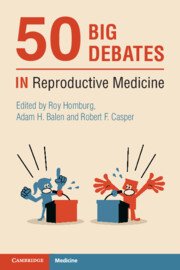Book contents
- 50 Big Debates in Reproductive Medicine
- Series page
- 50 Big Debates in Reproductive Medicine
- Copyright page
- Contents
- Contributors
- Foreword
- Introduction
- Section I Limits for IVF
- Section II IVF Add-ons
- Section III The Best Policy
- Section IV Embryology
- Section V Ethics and Statistics
- Section VI Male-factor Infertility
- Section VII Genetics
- Section VIII Ovarian Stimulation
- 41A AMH Is a Better Predictor of Ovarian Response Than AFC
- 41B AMH Is a Better Predictor of Ovarian Response Than AFC
- 42A Pituitary Suppression Using GnRH Agonist for IVF Is Outdated
- 42B Pituitary Suppression Using GnRH Agonist for IVF Is Outdated
- 43A The Maximum Effective Dose of FSH for Ovarian Stimulation in IVF Is 300 IU
- 43B The Maximum Effective Dose of FSH for Ovarian Stimulation in IVF Is 300 IU
- 44A There Is No Place for Natural and Mild Stimulation IVF
- 44B There Is No Place for Natural and Mild Stimulation IVF
- Section IX Hormones and the Environment
- Index
- References
43B - The Maximum Effective Dose of FSH for Ovarian Stimulation in IVF Is 300 IU
Against
from Section VIII - Ovarian Stimulation
Published online by Cambridge University Press: 25 November 2021
- 50 Big Debates in Reproductive Medicine
- Series page
- 50 Big Debates in Reproductive Medicine
- Copyright page
- Contents
- Contributors
- Foreword
- Introduction
- Section I Limits for IVF
- Section II IVF Add-ons
- Section III The Best Policy
- Section IV Embryology
- Section V Ethics and Statistics
- Section VI Male-factor Infertility
- Section VII Genetics
- Section VIII Ovarian Stimulation
- 41A AMH Is a Better Predictor of Ovarian Response Than AFC
- 41B AMH Is a Better Predictor of Ovarian Response Than AFC
- 42A Pituitary Suppression Using GnRH Agonist for IVF Is Outdated
- 42B Pituitary Suppression Using GnRH Agonist for IVF Is Outdated
- 43A The Maximum Effective Dose of FSH for Ovarian Stimulation in IVF Is 300 IU
- 43B The Maximum Effective Dose of FSH for Ovarian Stimulation in IVF Is 300 IU
- 44A There Is No Place for Natural and Mild Stimulation IVF
- 44B There Is No Place for Natural and Mild Stimulation IVF
- Section IX Hormones and the Environment
- Index
- References
Summary
There is evidence to suggest that higher gonadotropin dose might be associated with higher number of oocytes retrieved. The potential association of the higher number of oocytes and cumulative live birth rates, in particular in poor responders, needs to be further investigated in well-designed randomised trials. Nevertheless, the gonadotropin regimen should be administered with caution, taking into account patient safety and efficacy, until further evidence could justify the use of higher gonadotropin dose during ovarian stimulation in poor responders.
- Type
- Chapter
- Information
- 50 Big Debates in Reproductive Medicine , pp. 225 - 227Publisher: Cambridge University PressPrint publication year: 2021

